vigi-, vig-
(Latin: watchful, wakeful, alert)
When someone passes a gate, or door, of a place holding an item with an electronic article surveillance that hasn't been turned off, an alarm sounds.
Corporations use electronic surveillance to maintain the security of their buildings and grounds.
Electronic surveillance permeates almost every aspect of life in the United States; for example, in the public sector, the president, Congress, judiciary, military, and law enforcement all use some form of this technology.
In the private sector, business competitors, convenience stores, shopping centers, apartment buildings, parking facilities, hospitals, banks, employers, and even spouses have utilized various methods of electronic surveillances.
- Improvement of security for people and property.
- Detection or prevention of criminal, wrongful, or illegal activities.
- The interception, protection, or the obtaining of valuable, useful, scandalous, or embarrassing information about a person or numerous people.
Electronic eavesdropping or electronic surveillances have several objectives:
2. Primarily British, to keep watch over students during a period of testing in order to prevent cheating: Mr. Stern was invigilating his class while they were taking their final exams.
3. Etymology: a descendant of the Latin verb vigilare, meaning "to stay awake".
The Latin vigilare is the ancestor of English vigilant, "watchful", and it also gives English reveille, "a signal to wake up in the morning"; via French réveiller; as well as, surveillance, "close watch, supervision", from French surveiller.
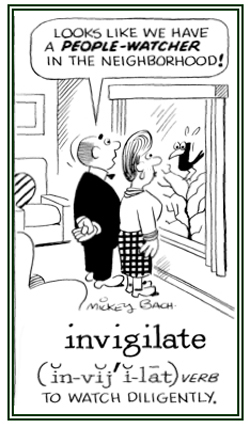
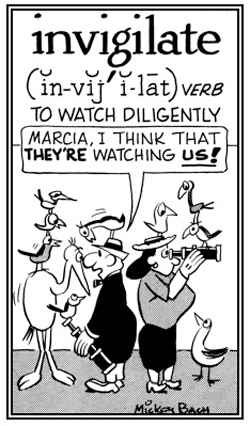
Go to this Word A Day Revisited Index
so you can see more of Mickey Bach's cartoons.
2. The act of surveying or being alert: All military bases have 24-hour invigilations to secure the safety of everyone who is working or living in those establishments.
2. Etymology: From French reveillez, "wake up"; from Middle French reveiller, "to awake, to rouse", from re- and eveiller, from Old French esveillier, from Vulgar Latin exvigilare, from ex-, "upward" and Latin vigilare, "to watch".
Although the following cartoon is for a noun, it still illustrates the meaning of this verb entry.
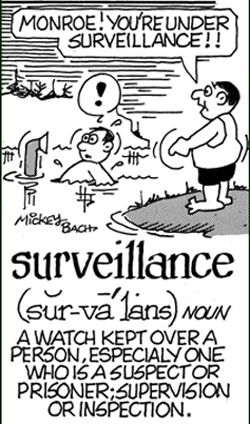
Go to this Word A Day Revisited Index
so you can see more of Mickey Bach's cartoons.
2. The act of keeping a careful eye someone or something in order to detect or to prevent any kind of felonious act or to provide evidence of such actions: The surveillances provided by the bank's video cameras helped to identify the bank robbers.
Electronic surveillances are being utilized by more cities around the world in order to apprehend lawbreakers who are involved in illegal activities.
3. Etymology: from French surveillance, "oversight, supervision, a watch"; a noun of action from surveiller, "oversee, watch"; from sur-, "over" + veiller, "to watch" from Latin vigilare, from vigil, "watchful, awake, wakeful".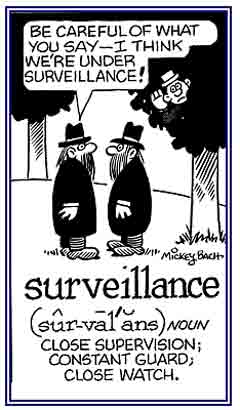
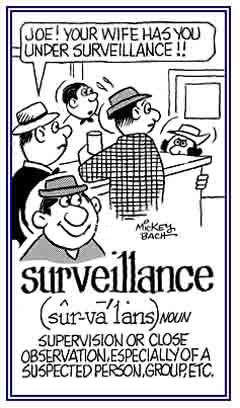
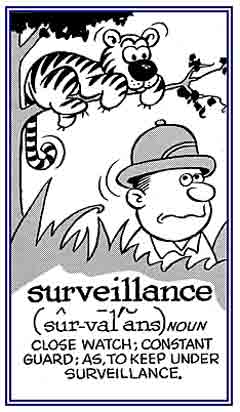
Go to this Word A Day Revisited Index
so you can see more of Mickey Bach's cartoons.
2. Etymology: from Latin sur, "over" + veiller, "watch" or vigilare, "to keep watch".
2. A night-time period of staying awake to look after a sick person, to pray, etc.: As Tim's father lay in a coma, his family kept a vigil and prayed that he would recover.
Some religious vigils include prayers that take place on the eve of special holy days.
2. Etymology: from Latin vigilantia, from vigilare, "to keep awake".
2. Being careful and noticing problems or signs of unacceptable behavior: The vigilant employees of the store were always watching for customers who might commit thievery.
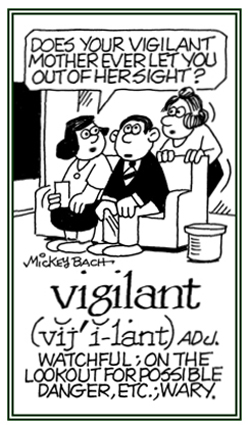
Go to this Word A Day Revisited Index
so you can see more of Mickey Bach's cartoons.
In the past, some vigilantes went too far and executed some suspects without any valid proof of their guilt.
2. Etymology: from Spanish, "watchman, vigilante"; from Latin vigilans, vigilant-; present participle of vigilare, "to be watchful"; from vigil, "watchful".When traveling in the town, tourists were warned to be vigilantly careful about getting back to their hotels before it got dark.
